- Home
- Anne Hampson
Isle of Desire
Isle of Desire Read online
Isle of Desire
by
ANNE HAMPSON
She wanted his love, but he was unloving
Laura had known it was a gamble. But working on a tropical island, even temporarily, appealed to her.
Admittedly, the Conde Duarte de Taviro Mauredo had commissioned her father to restore his paintings. But, as she had assisted her father before his death, she was sure she was competent.
The Conde, however, took a different view of the deception. “You will be accommodated here at the Palacio until one week today.” he said arrogantly. “That is the next flight out.”
CHAPTER ONE
The pale sun was setting behind the serrated line of tall buildings which stood out in all their stark ugliness against an April sky. High-rise flats. They formed a pattern of uneven concrete blocks behind the maze of factory buildings in the foreground. Casting a glance through the window, Laura Conroy frowned a little, then returned to her packing. Forty-eight hours from now she might be comfortably settled in a luxurious palacio on an island in the Tropics—or, far more probably, she could be on her way back home.
That she was practising deceit was an undoubted fact; whether or not she would get away with it remained to be seen.
One large suitcase was already in the hall; the one she was packing would soon join it. Both would accompany her first thing in the morning when the taxi came to take her to the airport.
Meanwhile, she had a date with her friend, Avice, who had insisted on taking her out to dinner, not because she was going away, but because she was today celebrating her twenty-fourth birthday.
After taking the suitcase to the hall Laura set about ticking off the numerous little jobs which of necessity had been left to the last. Her flat was being closed up; it would be reopened either in a couple of days’ time, or in six months’ time, depending on whether her deception would be condoned by the illustrious gentleman for whom she hoped to work.
The Conde Duarte Andre Volante de Taviro Mauredo ... With a name like that he was bound to be illustrious, Avice had said with a grin. He would also be elderly, running to seed, and would probably be suffering from gout—or the modern equivalent—from over-indulgence in eating and drinking. He would be arrogant, full of his own importance because he owned an island.
‘That kind never stops to think that it was their ancestors whom they’ve to thank for where they are,’ Avice had continued, just as if she knew all about the man whose priceless paintings her friend was hoping to restore. ‘You were telling me that this island of Torassa was purchased two centuries ago, and that the family of Mauredo had left Portugal to settle there after building themselves a magnificent palace?’
‘That’s right. The Conde explained all this in his first letter to my father. ’
The first letter ... Laura was thinking about it as she bathed and dressed for the dinner at the Oaklands Hotel. In the letter the Conde had begun by saying he had had Mr. Leonard Conroy’s name given to him by a friend who. had highly recommended his work. The Conde had then gone on to ask Mr. Conroy if he would come over to the island and restore some paintings of his which required attention. The offer was accepted and Laura, who from the time of leaving the art school had assisted her father, had become excited at the prospect of living on a tropical island in the sun. The work would take about six months, the Conde had written, but he went on to say that time was not so important as a perfect result. And so if the work took twelve months it would be quite all right.
But long before Mr. Conroy had made arrangements for the journey, another letter arrived with the information that the work would have to be postponed. No reason was given; Laura had then gained the impression that anyone with a name like that of the Conde would consider it beneath his dignity to offer explanations to those whom he had been proposing to employ. A month after the arrival of this second letter Laura’s father had had a heart attack and died. This was over eighteen months ago. The Conde had obviously not heard of Mr. Conroy’s death because, three weeks ago, he had written to say that the time was now convenient to him and he requested that Mr. Conroy would come over as soon as possible and begin the restoration of the precious works of art. The letter, written in a purely businesslike manner, was addressed to L. Conroy, and it was while her eyes were focused on the initial that the daring idea was formulated in Laura’s mind. Her own initial was L. More important, though, was the fact that she was an expert in her own right, having learned more from her father than she had at the art school where
she had done so well.
She had replied to the Conde’s letter, promising to arrive on the island in less than a month’s time. She had signed her letter, L. Conroy.
Recollecting this as she took up a hairbrush from her dressing-table, Laura could not help smiling as she tried to picture the Conde’s face when he saw who had arrived. Undoubtedly he would be taken aback, and it could transpire that he would order her to leave without even allowing her to show him the testimonials she carried, proving that she was capable of doing his work. It was a risk, but if it came off she would have the satisfaction of working on some very rare and beautiful paintings, and in addition she would have the pleasure of living in a palace.
The smile faded presently as she made a critical examination of herself as she began to brush her hair. Shy, grey-green eyes which—so her father had always maintained—became moist and limpid when she smiled, stared back at her from the mirror. Her skin, of the transparent quality of fine china, required no makeup, nor did her lips. They were just like her mother’s had been, her father used to say—‘as red as ripe cherries’. Her manner had always been reserved and serious, her voice quiet and yet musical. A small sigh escaped her, for she was thinking of the way her father used to compare her with her mother. She wished she had known her, but Laura was only two years old when she died.
At last she put the brush down; her hair, a cascade of rich russet-brown, fell on to her shoulders, straight and shining and flicked up at the ends. A little perfume was sprayed upon it before, putting on an evening cloak of black velvet, Laura took up the sequin-trimmed bag and went out to the garage where she kept her car.
Half an hour later she was with her friend, in the hotel lounge, drinking an aperitif while waiting to be conducted to their table.
‘Well, I expect the excitement’s reaching fever pitch by now?’ Avice smiled at Laura and added, ‘I’m keeping my fingers crossed that this stuffy old Portuguese count will take you on. ’
‘I’m aware of the risk,’ returned Laura frankly. ‘It wouldn’t
surprise me if he orders me off the premises right away.’
‘You might not get as far as entering them,’ Avice warned. ‘He’s bound to be angry at being duped.’
Laura nodded in agreement. How humiliating it would be if she got no further than the front door! But that was not a logical thought, she instantly decided. She must be invited into the palace—probably by a stiff forbidding butler who had been with the Conde for forty years or more.
‘I must admit,’ she mused, rather absently sipping her drink, ‘that I’m beginning to feel a little apprehensive, now that the time for meeting the Conde is drawing near. ’
‘I can understand that,’ was her friend’s grim rejoinder. ‘For my part, I’d have got cold feet long before now and written to tell him I couldn’t come.’
‘I would never do that. I want to see this island. It sounds intriguing. Just imagine one family owning a whole island! ’
‘It mightn’t be very large.’ Avice picked up her glass from the table. ‘I don’t suppose you know anything about his family?
I mean, whether he has children or not?’
‘I expect he has. These aristocrats who own property usu
ally want an heir.’
Avice nodded her head.
‘He’ll probably have a tall angular wife who makes you feel like something that crawls, she’s so superior. She’ll wear diamonds no matter what time of day it is, and heavy gold necklaces and bracelets. She’ll walk about the palace giving orders and stopping now and then to run a finger along the wainscoting to see if the maids have done the dusting properly. ’ Laura laughed.
‘We could be all wrong, you know. His wife might be charming.’
‘Shouldn’t think so. They’re all snobs, those foreign aristocrats and their families. You’ll find the children are so uppish they won’t even look at you. No use going to that island with the romantic notion of attracting one of the Conde’s sons. Their marriages will have already been arranged for them— when they were about five years old, I shouldn’t wonder.’ ‘I can assure you,’ said Laura firmly, ‘that I shan’t be wasting my time on the Conde’s sons. I’m going to restore pictures, not to run after someone who is obviously so far above me that his attention could never reach me anyway—’ She stopped, and they both burst out laughing.
‘Yes,’ nodded Avice, ‘I know. We’re assuming all sorts of things that are probably wrong, and inventing people who might not exist. ’
The waiter’s appearance precluded any further discussion on the subject for a while. They were conducted to their table; the first course was served, and the wine.
‘This is marvellous!’ exclaimed Laura when presently the orchestra began playing quiet classical music. ‘You’ve certainly made my birthday memorable. Thank you very much—’ She was stopped by her friend’s interruption,
‘Don’t thank me, Laura. I planned it some weeks ago, and I’ve really been looking forward to it. Your pleasure’s no greater than mine.’
‘Nevertheless,’ returned Laura seriously, ‘I must thank you.’ Avice merely smiled and a few moments later she and Laura were again discussing the appointment.
‘Did he know just how well-known your father was in the art world?’ Avice asked.
‘I don’t think so; someone had recommended him, certainly, but there was nothing in the Conde’s letters to suggest that he had much knowledge at all about Father.’
Avice was frowning slightly.
‘In that case, it’s going to be very difficult indeed for you to convince him that you’re capable of restoring these paintings. Had he known how great was your father’s ability, then he might have taken more kindly to you, as his student. ’
‘I’ve thought of all that,’ admitted Laura, ‘and there’s truth in what you’re implying: he might refuse to believe that I’m capable of handling such precious works of art. ’
‘You do have your testimonials, though. Those should go some way to convincing him. ’
‘If he’ll read them, of course.’
‘Oh, well,’ said Avice philosophically after a pause, ‘you’ll just have to wait and see. After all, you’ll not have lost much even if he sends you packing. ’
They both laughed, although Laura herself knew she would be bitterly disappointed if she were sent packing, as her friend termed it.
‘Only my air fare,’ she said.
The second course was brought and the conversation became more general. Then, with the meal over, they returned to the lounge for a final drink.
‘To you—and your success on the island of Torassa!’ Avice held up her glass. ‘If any sincere wish of mine can bring you success, then success you most certainly shall have!’
The aeroplane was descending on to the island, an island that, even from the air, seemed characteristic of some fabulous terrain of a Disney film. Laura could see the Palacio, white against a background of several shades of green which she surmised to be made up of sweeping lawns, tropical shrubberies and exotic woodland surrounds. Colour came into focus; flower beds galore, then shapes which she deduced to be statuary. A fountain sparkled in the sunshine; a blue swimming-pool nestled among trees and shrubs and a rockery, from which water cascaded like threads of silver, into the pool.
Idyllic was the description that flashed into her mind. What a place to live! It seemed like fairyland, unreal, a place where heaven was just a breath away.
The aircraft rushed past the trees, then seemed to be stationary as it touched down and taxied to a smooth, almost imperceptible standstill. Laura was aware of bronzed faces, flashing smiles, leisurely movements. There seemed to be no hurry and scurry as she had known when landing at other airports.
A car was drawn up not far from the aircraft itself; Laura was later to learn that the Conde’s chauffeur was quite used to driving up, close to the aircraft, whenever he had to meet either his employer or some visitor from abroad.
The uniformed man stood, looking rather blank as the last of the passengers alighted. Laura approached him and, smiling in the most winning way she knew, she inquired if he were here to pick up a certain L. Conroy. The man brightened and said yes, he was. Surprised that he should speak such excellent English, Laura said nothing for a moment and then, still smiling, she said that she was L. Conroy.
The man frowned at her and shook his head.
‘I’m here to pick up an English gentleman,’ he told her, his eyes scanning the tail-end of the passengers as they made their way towards the Customs shed.
‘I have come in his place.’
‘You?’ The man stared at her disbelievingly. ‘I think—’
‘Will my luggage be through yet?’ she interrupted. ‘Perhaps you will see to it for me, and put in into the car?’
‘But-----’
‘I assure you it will be all right,’ said Laura, wishing she had as much confidence as she was endeavouring to display. ‘The Conde is expecting me.’
‘A gentleman,’ said the man stubbornly.
‘A lady,’ she said and, without any more ado, she opened the door and got into the back of the car. To her relief she saw the man shrug his shoulders, and a few minutes later he was driving her off the landing-strip. Soon her luggage was in the car and they were on their way to the Palacio, passing through leafy lanes of exotic beauty before reaching a small town where smiling brown people waved gaily as the car sped along the main thoroughfare, its silver crest gleaming in the sunshine. Laura was so fascinated by her surroundings with their Eastern flavour that she was not for the present troubled by the apprehension that was slowly rising in her subconscious mind. But when eventually the car turned in through two high, exceedingly ornate wrought-iron gates, she forgot everything else but the meeting that was shortly to take place. The long curving drive was in reality another leafy lane, with lush green grass growing on either side, grass cut to look like a velvet carpet, soft and inviting to the feet. Flower beds blazing with colour provided the delightful patterns with which the green carpet was strewn. Looking beyond the tall trees which backed the wide verges, Laura saw the palace setting— sweeping lawns, a cascading fountain making rainbows, in the sun, terraces blazing with colour, statues holding lamps which, she surmised, were lighted at night. In the distance was a shining lake overhung with trees; on its smooth waters aquatic plants sent forth a blaze of colour and, swimming about among them, were brightly-plumaged birds. On the bank several peacocks preened themselves, while the less colourful peahens looked on.
Then came the house itself, and Laura gave a little gasp as she took in its beauty and its size. White, like marble, its porphyry-encrusted facade forming the only real contrast, the great palace was a superlative example of an eighteenth-century senhorial house such as could be seen in Portugal itself. It had lacy Gothic-style windows and balconies, and many richly-sculptured embellishments including great white columns around which grew bougainvillaea vines in various colours.
The car swung into a wide curve before coming to a smooth halt in front of a flight of marble steps flanked by huge stone vases containing Traveller’s Palms.
The chauffeur got out and opened the door for her. She stepped from the car, her mind now becomin
g dazed by all the splendour of her surroundings. An emerald humming-bird darted past her, barely a couple of feet from her face, and flew to a nearby bush of vivid scarlet flowers. Another flash of colour was made by a parakeet flitting about among the delicate blue flowers of a jacaranda tree. Behind her the door opened, jerking her mind back to stark reality and the knowledge that, within the matter of a few minutes, she could be getting back into the car.
She turned, almost reluctantly, lifting an unsteady hand to remove a tendril of russet hair from her eyes. Her heart was beating far too quickly for comfort, and something intangible was affecting her breathing.
A butler stood there, not the ancient retainer whom she and Avice had invented, but a smart, square-shouldered young man of about thirty years of age. His face, unsmiling, was brown, his hair black. She saw his eyes move to the stolidfaced chauffeur, an expression of inquiry in their depths. Words passed between the two, but as they spoke in Portuguese Laura had no idea what was being said.
‘I have come instead of my father,’ she decided to explain as soon as the men stopped talking. ‘I trust the Conde will see me.’ For a moment she thought the butler did not understand her language, so impassive was his face. However, he moved aside, allowing her to enter the massive hall which was hung with tapestries of exquisite workmanship and design. Weapons of all kinds decorated the panelled walls of this light and airy apartment where flowers predominated. They grew in pots which were themselves encased in urns of gleaming silver, bronze and copper.
‘Dom Duarte is indeed expecting a gentleman,’ said the butler in excellent English. ‘I will inform him of your arrival.’
‘Dom Duarte?’ she frowned. ‘Isn’t it the Conde whom I’m to meet?’
The man portrayed surprise, but only for a few seconds.
‘It is correct for you to address the Conde as Dom Duarte,’ he said, and the trace of a smile came to his lips. ‘In Portugal, and of course here on Torassa, Dom is in itself a title.’
‘I see ...’ Not for the life of her could she imagine herself using the Conde’s Christian name, but of course she did not say anything to the butler, merely moving towards an open door which he was indicating, the flick of his hand an invitation for her to enter.

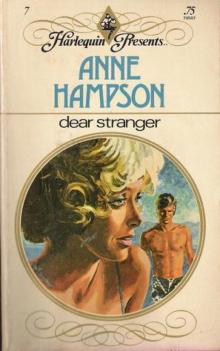 Dear Stranger
Dear Stranger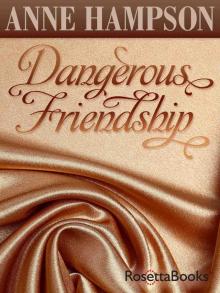 Dangerous Friendship
Dangerous Friendship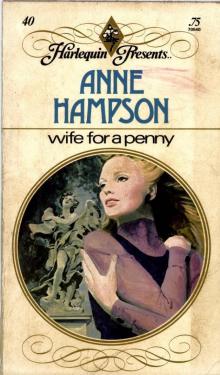 Wife for a Penny
Wife for a Penny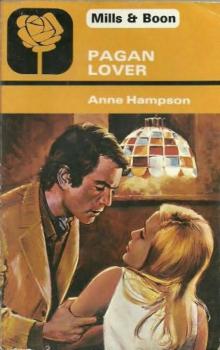 Pagan Lover
Pagan Lover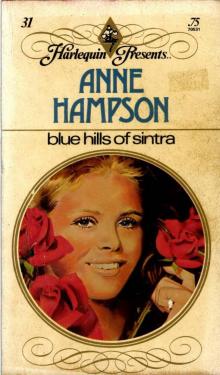 Blue Hills of Sintra
Blue Hills of Sintra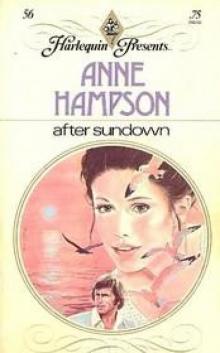 After Sundown
After Sundown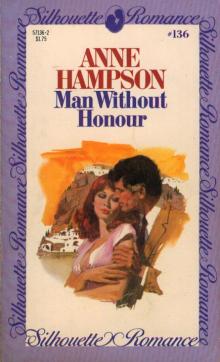 Man Without Honour
Man Without Honour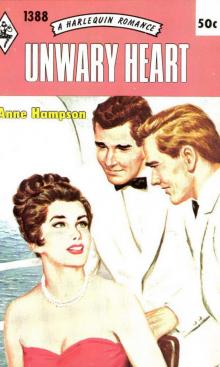 Unwary Heart
Unwary Heart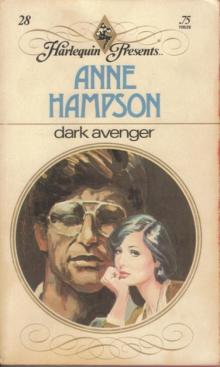 Dark Avenger
Dark Avenger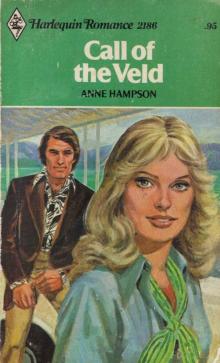 Anne Hampson - Call of The Veld
Anne Hampson - Call of The Veld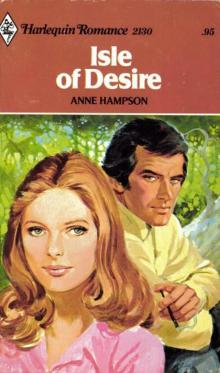 Isle of Desire
Isle of Desire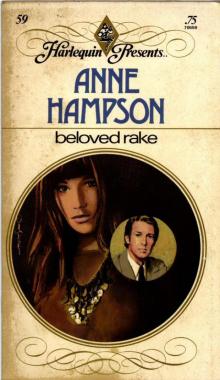 Beloved Rake
Beloved Rake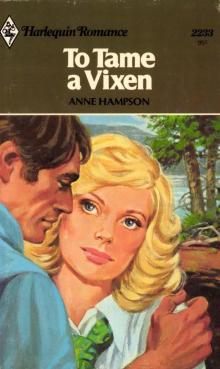 To Tame a Vixen
To Tame a Vixen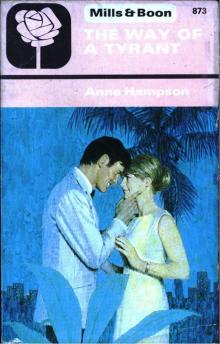 The Way of a Tyrant
The Way of a Tyrant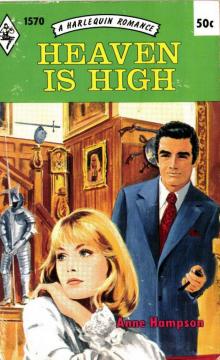 Heaven is High
Heaven is High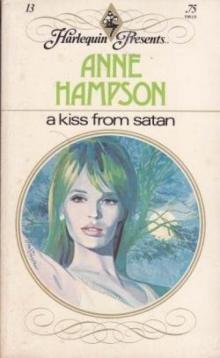 A Kiss From Satan
A Kiss From Satan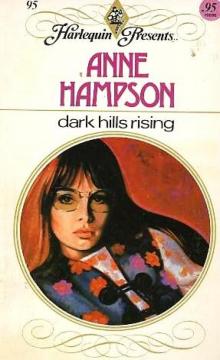 Dark Hills Rising
Dark Hills Rising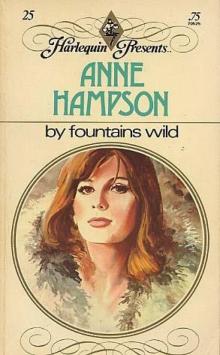 By Fountains Wild
By Fountains Wild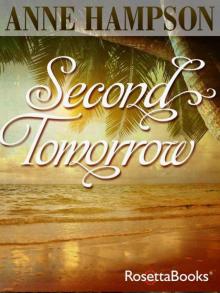 Second Tomorrow
Second Tomorrow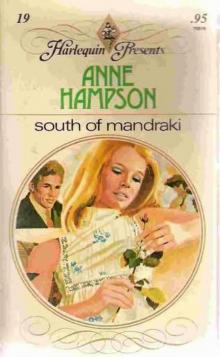 South of Mandraki
South of Mandraki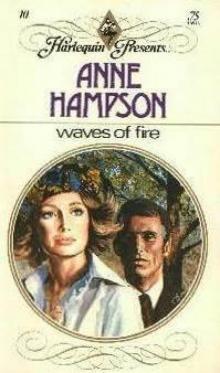 Waves of Fire
Waves of Fire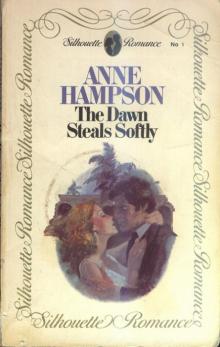 The Dawn Steals Softly
The Dawn Steals Softly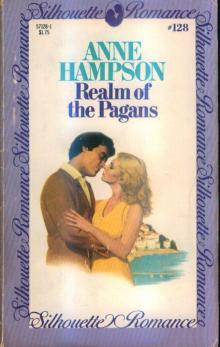 Realm of the Pagans
Realm of the Pagans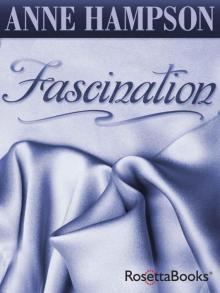 Fascination
Fascination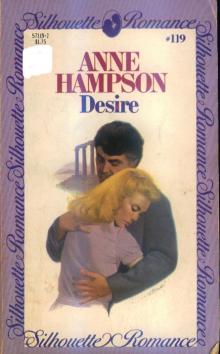 Desire
Desire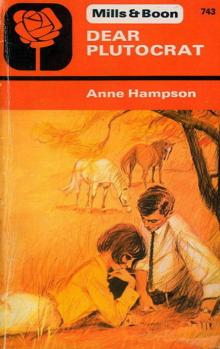 Dear Plutocrat
Dear Plutocrat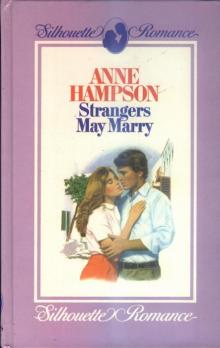 Strangers May Marry
Strangers May Marry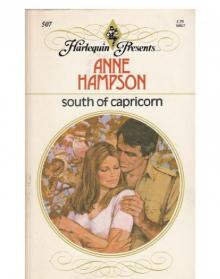 South of Capricorn
South of Capricorn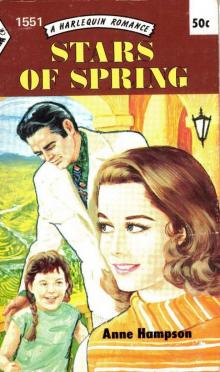 Stars of Spring
Stars of Spring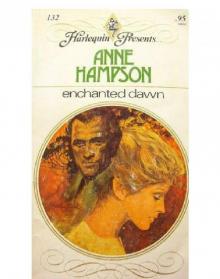 Enchanted Dawn
Enchanted Dawn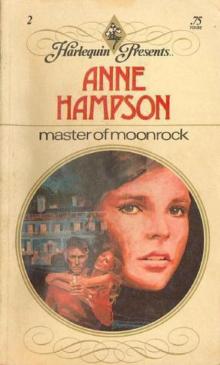 Master of Moonrock
Master of Moonrock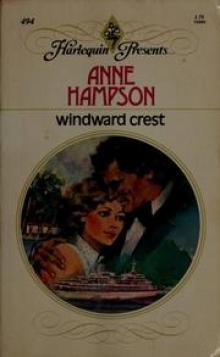 Windward Crest
Windward Crest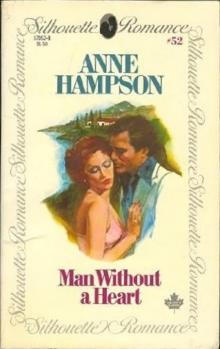 Man Without a Heart
Man Without a Heart